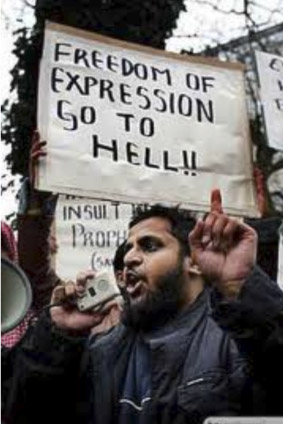
The Egyptian thinker Nasr Hamid Abu Zayd argued that the mechanisms which govern the large part of religious discourse are the same, whether they manifest themselves in moderate or extremist discourse. He maintained that these mechanisms underpin the intellectual premises of discourse to such an extent that they converge with them, so that the one cannot be distinguished from the other.
THE MOST IMPORTANT of these mechanisms, in his view, are the following:
Fusing speculation with religion, and the denial of there being any separation between one’s self and one’s subject;
The interpretation of all phenomena by referring them all to a primary principle or cause – placing social and natural phenomena on the same level;
The reliance on the authority of the Salaf or tradition – by promoting the traditional texts (which are secondary texts) to the status of primary Texts, so that they enjoy a huge degree of sanctity, in many cases a sanctity not inferior to that of the original, primary Texts;
Black and white thinking and ‘categoric’ intellectual certitude – the rejection of any difference of opinion other than that referring to subsidiary issues or matters of detail, as opposed to fundamental or basic issues;
The dismissal, and ignorance, of the historical dimension – manifested in mourning for a beautiful past, and to this purpose equating the golden age of the Orthodox Caliphate with the era of the Ottoman Turkish Caliphate.
The mechanism of fusing speculation with religion refers to how religious discourse fails to distinguish between religious texts which occupy their own spheres and others that are subject to the activity of the human intellect and human experience. This distinction, according Abu Zayd, did exist in the first moments of Islamic history, the period when the Revelation and the formation of the Texts took place. Abu Zayd sees that the first Muslims made a distinction between the Prophet’s behaviour as governed by Revelation, as opposed to that dictated by experience and intellect.
In questions to do with experience and the intellect, Muslims generally used to differ with the Prophet and come up with alternative suggestions. Abu Zayd believed that religious discourse is unaware of these differences and instead extends the active influence of the religious texts onto all spheres, making an amalgamation between the texts and their understanding of them. In this way religious discourse annuls the epistemological space between the self and the subject, claims an ability to surpass all conditions and barriers to understanding the Divinity’s purpose, and enters the realm of ‘speaking in God’s name.’ All exponents of religious discourse present their understanding of Islam or of its texts unhesitatingly as ‘Islam’, believing in their natural ‘possession’ of truth.
An insistence on rejecting pluralism in their understanding of Islam leads to two results, as Abu Zayd saw it. The first is that Islam has one, fixed, meaning that is uninfluenced by historical progression or by differences in societies or the plurality of groups within one community. The second is that this single, fixed meaning is the possession of a specific community of men – the religious scholars – who are immune from natural human passions and prejudices. The corollary of this is that religious discourse creates a form of priesthood to represent authority and claims the final say in both religious and mundane matters, wielding its authority as something indisputable and unchallenged.
All exponents of religious discourse believe in their natural ‘possession’ of the truth
The mechanism of reducing phenomena to a primary principle in religious discourse may be made clear if we say that the discourse endeavours to interpret all natural and social phenomena by taking them back to that first principle. Despite the fact that the various creeds hold that the world owes its existence to a first cause, religious discourse endeavours to locate God in a present reality via the religious authority of men of the cloth, and by consulting them on everything that happens. This ends up with mankind and the laws of nature and society being overridden if these find no support in the authority of the men of the cloth. One of the features of this mechanism, according to Abu Zayd, is that it necessarily leads to theocracy, as opposed to the rule of man.
Thanks to this the various parts of the world appear scattered and nature appears dispersed, except for the thread that ties together every part of the world or nature to the prime originator. This type of conception is incapable of producing any knowledge about the world or about nature, let alone about society or mankind. Religious discourse employs this mechanism to attack any intellectual and human initiatives attempting to interpret and understand natural and social phenomena. As an illustration of this Abu Zayd gives the example of the concept of ‘secularism’, since he sees that religious discourse reduces it to one characteristic – a rebellion against religion.
By the mechanism of reliance on the authority of the Salaf or tradition Abu Zayd means the transformation of the words of the Salaf, and their legal interpretations, into Texts that are beyond discussion. Or more than this, to a fusion between those words and the faith itself. Religious discourse purposely ignores the part of Islamic tradition which contradicts any employment of this mechanism and instead refers the last word to its exponents. This represents an ideologically self-interested position for the discourse to take vis-à-vis the tradition. In Abu Zayd’s view this self-interested position on tradition helps the religious discourse dismiss the Texts’ historical dimension.
These exponents cannot tolerate any form of radical difference
As for the mechanism of black and white thinking and intellectual certitude, Abu Zayd pairs this with another mechanism: the mechanism of fusing thought with faith. He notes how the cohesion between the two mechanisms in religious discourse leads its exponents rushing to accuse their opponents of ignorance, or at other times disbelief. This is because these exponents cannot tolerate any form of radical difference, given that they claim to be possessors of absolute religious truth. Abu Zayd gives the example of the ‘definition of extremism’. He notes that religious discourse maintains that it is alone qualified to determine the definition, even though the study of extremism is a complex phenomenon that requires the cooperation of specialists in different fields.
Consequently, it is only natural that religious discourse on issues such as the hijab, growing one’s beard, the prohibition against association with women, singing, painting and photography will produce extremist views. The product of religious discourse ‘possessing’ religious truth is an inability to accept differences of opinion in anything other than trivialities. The discourse accordingly embraces severity and extremism, relying upon the language of black and white, the language of ultimate, categorical certitude. Excommunicating others as infidels is one of the foundations of faith, according to the religious discourse.

Suggested Reading
Abū Zayd on the intellectual premises of religious discourse
Abu Zayd believed that the mechanism of the dismissal of the historical dimension, the last of the mechanisms in this field, accounts for the illusory belief that intellectual endeavour or human understanding is interchangeable with foundational texts that belong to the past. For example, the fusion of thought with religion leads to a fusion between the human and the divine, and the granting of holy status to that which is human and temporal. It follows that religious discourse, as Abu Zayd maintained, does not content itself with dismissing the historical dimension and separating it from the time of the text, but claims for itself the power to understand the divine will. This also applies to the conception of a mutual valency of the issues of the present day with those of the past, and the assumption that the solutions of the past can be valid for the present day.
For Abu Zayd, all this only deepens mankind’s alienation as he is made to stand side by side with backwardness against the forces of progress, living outside of the march of history.

